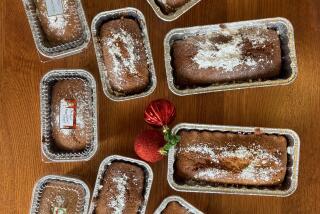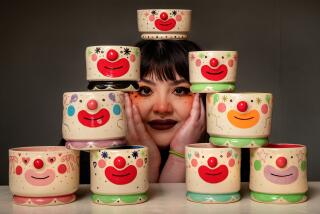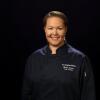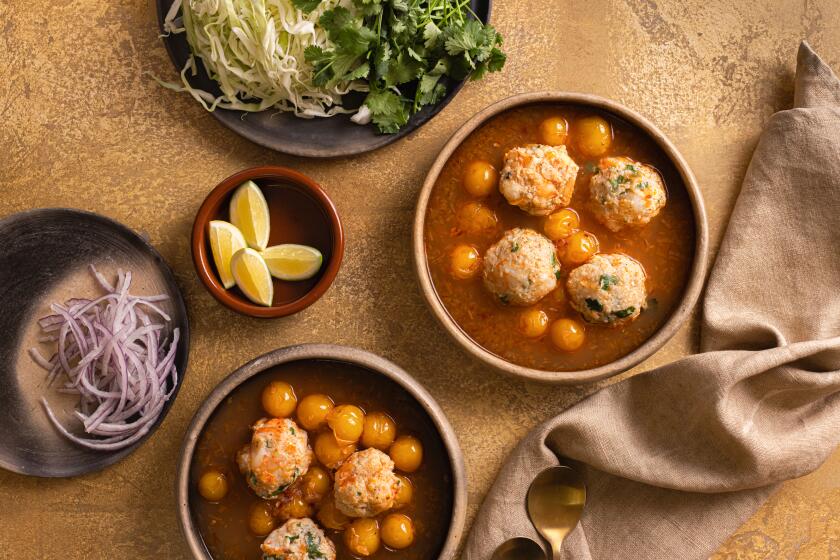Q&A: Koa Duncan, of Etsy’s CakeBoxVintage, on turning a passion for vintage into a virtual store
Koa Duncan always thought she’d be a studio artist. Coming from a family of artists, it’s in her blood. But she also comes from a family that loves to cook -- and eat -- food.
After studying fine arts in college, Duncan decided to go to culinary school. Her professional credentials include time at Delfina, Water Grill and Bastide (under both Alain Giraud and Ludo Lefebvre), her recipes have been published in numerous publications, she was short-listed on the James Beard Foundation’s top pastry chef list in 2006 and was named pastry chef of the year for Angeleno magazine in 2005.
When she’s not developing recipes or consulting, Duncan runs CakeBoxVintage, her Etsy store devoted to vintage aprons, cookbooks, china and jewelry. We caught up with Duncan on a recent morning to chat about her projects, and her inspiration.
Can you talk a little bit about your background? Both culinary and fine arts seem to run in your family.
They definitely both do, professionally more art than culinary. On my dad’s side, both my grandparents were fine artists. My grandmother was more of a printmaker, but my grandpa was a watercolorist. He started out as a jazz drummer when he was in his teens, and then he quit it all to raise a family, and did the war, and then did art school. He was amazing, and such a character.
You started originally in fine arts as well.
Yeah. I went to Orange County High School of the Arts [now known as Orange County School of the Arts], and I just thought that was it. I was going to be an artist and that’s the way it was. I went to community college for fine arts, up in Oakland. I was working as a nanny for extra income, and I happened to see a commercial for culinary school. It was showing pictures of cakes, and I thought, “I do all that stuff.”
It’s amazing how many people in the culinary industry started out in some other artistic field.
I feel like before the culinary occupation became popular, it wasn’t presented as a glamorous occupation. I don’t think I knew anybody who was a professional baker or chef. So it just didn’t occur to me to pursue it. Cooking was just what we did — we cooked, we baked.
Who were your culinary influences?
I worked at One Market as my first gig in San Francisco. And the pastry chef — she was really fantastic. I just wanted to be her when I grew up. And I liked her style. It was pretty rustic, about flavor more than plating. But not to the demise of plating — that looked pretty too.
And I worked for Donald Wressell at the Four Seasons which was a huge influence on me. I really, really loved working for him. He did all the pastry competitions. We got to see him practice, and it was so inspiring. To really think outside of the box and make stuff up.
And I really enjoyed his style. He did those pastry competitions – he was a coach at the time – you would see all these other influences. He would meet the team from Spain, and come home with notes on what they were doing, and throw some of that into the mix of our stuff. Of all the places I worked, I probably learned the most technical stuff there. Like there was just such a huge variety of stuff produced: chocolate sculptures, super high-end wedding cakes.
What’s your earliest food memory?
I don’t have one – I have a bunch from my mom. Her cinnamon rolls. She would make these giant pecan rolls that were from a Sunset cookbook that were fantastic. And she would make, I don’t know if they were danishes or croissants, but they were filled with almond paste.
We didn’t have a lot of money growing up, so I feel like she went that route because it was probably cheaper to make it herself. And it would be 10 times better than what we would find in the store. I remember chicken cacciatore that was just so good, with olives and just big chunks of chicken and it was just cooked forever and it just tasted like love.
Culinary school was such a big thing — and still is — for so many aspiring cooks. Is it necessary for someone trying to break out in the industry?
I went to the California Culinary Academy [now known as Le Cordon Bleu College of Culinary Arts in San Francisco], and really enjoyed it. I just did the baking and pastry angle of it, so it was really fun to kind of learn about everything from normal cinnamon rolls and cupcakes, to pastillage and all that crazy pulled sugar and stuff that really appealed to me as a fine artist.
I don’t think it’s necessary. I think depending on the school and the individual, it can be really helpful. In the right circumstance and with the right person.
Go and offer your time for free – to get your foot in the door – with somebody really big before you spend all that money on culinary school. If you come out of high school and you have a burning desire to cook, go impress somebody, and be their dishwasher for a while and slowly work your way in. Not a lot of kids are willing to do that. I don’t know that that would work for a lot of people, but that’s what I would suggest.
I think too many times schools just churn them out and these people think they’re going to have a cooking show or something glamorous. And they come out and they make hopefully a little more than minimum wage, working as a cook.
CakeBoxVintage is your Etsy shop. How did you get into vintage and where do you find so much cool stuff?
I’ve always gone to thrift shops with my mom, and found really cool stuff to wear, and then collected things. Back then everything was so cheap. Now it’s really expensive for the most part. So I just would collect stuff that looked pretty and caught my eye. I don’t know what it is — some people love it, and some people just don’t get it at all.
Vintage seems to have so much more personality than what you find nowadays.
Yeah. It’s personality and substance and history. I don’t know exactly how [CakeBoxVintage] happened. I’d heard of Etsy, and I was looking at it. And they have a vintage shop, and I was thinking, well, maybe. And there wasn’t a huge buy-in: You don’t have to buy a store or deal with rent. I have an excess of stuff from years and years of collecting. So I put a few things on and I got a pretty good response, and I was doing a little better than breaking even, which was great.
I do it for fun — it keeps me in collecting. I collect cookbooks and aprons and all of that for myself, and I thought it would be fun to share it. I’m not in a retail store, and I can reach more people. I’m like, “Oh, that went to Nebraska, or Arkansas.” I just sold a couple of aprons and a couple of cookbooks to a woman in Utah, and I was like, “Oh, I haven’t done Utah before. [Laughs] I enjoy that part of it.
Any tips for the home baker?
A good basic one would be planning ahead. It’s really what it’s all about for me. I could either be doing barely scraping by, or I could bake croissants. Plan your time.
And don’t be scared of stuff. Sometimes people get so intimidated about doing something. “Oh, I could never cook” or “Oh, I could never bake.” I say, “What are you talking about?” [laughs] If you can measure ingredients, then you can. You can actually follow a recipe. You’re not just winging it. You’ve got a recipe and you can read it and learn the terms and know how to measure. And if you get the basic things down, you really, you really can do anything.
Love cooking as much as I do? Follow me @noellecarter
More to Read
Eat your way across L.A.
Get our weekly Tasting Notes newsletter for reviews, news and more.
You may occasionally receive promotional content from the Los Angeles Times.







